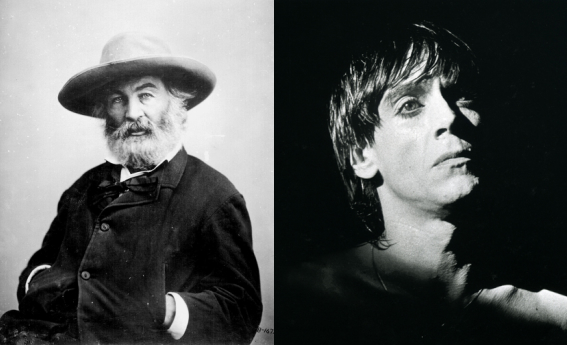
Image of Iggy Pop by Patrick McAlpine, via Wikimedia Commons
I don’t know why no one thought of this ages ago: an album of Walt Whitman’s poetry, set to moody, atmospheric electronic music and read by former Stooge and current American badass Iggy Pop. It makes perfect sense. Though Pop may lack Whitman’s verbal excesses, preferring more Spartan punk rock statements, he perfectly embodies—in a very literal way—Whitman’s fearless, sexually-charged “barbaric yawp.” And both artists are very much American originals: largely self-taught Whitman cast aside 19th-century decorum and formal constraints to write wildly expressive verse that celebrated the body, the individual, and American industrial noise; self-taught Pop cast aside 20th century rock formalism to create dangerously expressive music that celebrated… well, you get the idea.
I don’t know if he would have written “Now I wanna be your dog,” but in contrast to “the popular, well-educated poets of the time, those sensitive noblemen,” Whitman wrote—says Pop in his own distinctive paraphrase—“Fuc% as$.”
You know, I think he had something like Elvis. Like Elvis ahead of his time, one of the first manic American populists. You know you’re looking at pictures of him, and he was obviously someone who was very much involved with his own physical appearance. His poetry is always about motion and rushing ahead, and crazy love and blood pushing through the body. He would have been the perfect gangster rapper. Whitman says, even the most beautiful face is not as beautiful as the body. And to say that in the middle of the 19th century is outrageous. It’s a slap in the face.
Of the many rock and roll interpreters of literary greats we’ve featured on this site, I’d say Iggy Pop’s reading of, and commentary on, Whitman may be my favorite.
Unfortunately, we can only bring you a short excerpt, above, from Pop’s collaboration with instrumental duo Tarwater and German electronic artist Alva Noto (who recently scored Alejandro Iñárritu’s The Revenant with Yellow Magic Orchestra’s Ryuichi Sakamoto). This two-minute sample comes from a 2014 album these artists made together called Kinder Adams—Children of Adam, which features several abridged renditions in German of Whitman’s most famous book, Leaves of Grass by various voice actors, then a complete reading by Pop, set to a throbbing, haunting score.
Now, Pop, Alva Noto, and Tarwater have come together again to revisit Whitman with a seven-track EP simply titled Leaves of Grass. Like the early, self-published first edition of Whitman’s book, this work will only reach a few hands. “Released on Morr Music with no digital version planned,” reports Fact Mag, “Leaves of Grass is only available in a limited vinyl edition of just 500 copies, complete with embossed artwork.” You can purchase a copy of this artifact here (act fast), or—if you prefer your more traditional Iggy Pop without the literature, moody, post-rock soundscapes, and rarefied formats—wait for his new album in March with Queens of the Stone Age’s Josh Homme, sure to hit digital outlets near you. Whether or not he’s reading Whitman, he’s always channeling the poet’s energy.
Related Content:
Iggy Pop Reads Edgar Allan Poe’s Classic Horror Story, “The Tell-Tale Heart”
Tom Waits Reads Two Charles Bukowski Poems, “The Laughing Heart” and “Nirvana”
Walt Whitman’s Poem “A Noiseless Patient Spider” Brought to Life in Three Animations
Orson Welles Reads From America’s Greatest Poem, Walt Whitman’s “Song of Myself” (1953)
Josh Jones is a writer and musician based in Durham, NC. Follow him at @jdmagness


Iggy Pop & Tarwater & Alva Noto: From Pent-Up Aching Rivers (2016)
https://www.youtube.com/watch?v=K0xdxMsR-o8